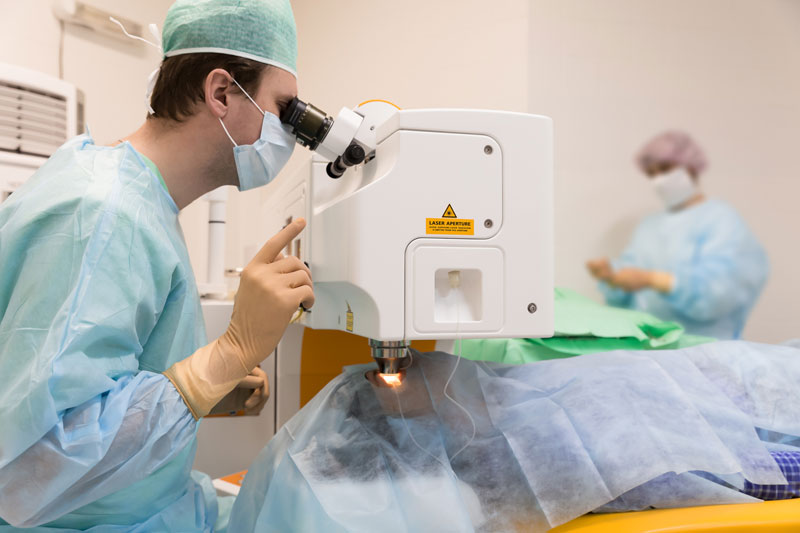LASIK surgery has transformed vision correction, offering freedom from glasses and contact lenses for millions worldwide. However, it is important to follow certain precautions after LASIK surgery for a successful recovery and optimal outcomes.
In this article, we will discuss the precautions one must take after LASIK surgery to optimize healing, minimize complications, and achieve the best possible results.
What is LASIK Surgery?
LASIK, or Laser-Assisted In Situ Keratomileusis, is a popular refractive surgery that corrects vision by reshaping the cornea using a laser, which is the clear front part of the eye. The procedure is highly effective in treating nearsightedness, farsightedness, and astigmatism, providing rapid visual improvement and minimal discomfort.
What Is the Expected Recovery Time After LASIK Surgery?
After LASIK surgery, the expected recovery time varies among individuals but usually ranges from a few days to several weeks. Most patients experience improved vision within 24 to 48 hours post-surgery, with gradual enhancement over the following weeks. While some may resume normal activities shortly after the procedure, complete recovery, including stabilization of vision and resolution of any residual symptoms, may take up to six months.
Adhering to post-operative care instructions and attending follow-up appointments are essential for monitoring progress and ensuring optimal healing and long-term results.
Expert Recovery Tips After LASIK Surgery
Below are some recovery tips to be followed post-LASIK surgery that promote rapid healing and long-lasting results:
- Rest and recovery:Adequate rest is essential to promote healing. Resting your eyes allows for proper healing of the cornea. It’s common to have difficulty seeing or blurred vision for 24 to 48 hours post-surgery. Resting your eyes during this time can relieve strain and help with relaxation.
- Avoid strenuous exercises:Patients are advised to avoid strenuous activities, including heavy lifting and exercise, for the first few days post-surgery.
- Follow the prescription:Patients must adhere to the prescribed medications. Usually, eye drops are prescribed to prevent infection, reduce inflammation, and keep the eyes lubricated. Patients must follow the prescribed dosage and frequency accurately.
- Stay hydrated:After LASIK, dry and itchy eyes are very common. To relieve this discomfort, use the artificial tears suggested by your surgeon post-procedure. Refrain from using other eye drops to avoid complications. Ensure adequate fluid intake to stay hydrated.
- Seek assistance:Blurred vision may hinder a few of your daily activities. It’s recommended to have a companion who can assist with these tasks, like cooking, driving, or medication administration.
- Adhere to your surgeon’s guidance:Following your surgeon’s instructions is a must. With their expertise, they can distinguish what helps or hinders your post-surgery recovery. They will furnish a set of guidelines that should be diligently followed to facilitate a seamless healing process.
- Maintain cleanliness:Ensure a clean, dry environment to prevent post-operative infections. Avoid touching your eyes with dirty hands.
- Protecting the eyes:Patients are instructed to wear protective eyewear, such as sunglasses, to shield their eyes from bright light and UV exposure during the initial healing period.
- Limit screen time:Avoid using mobile phones or other devices that strain your eyes, as excessive screen time can fatigue them and hinder post-LASIK healing.
- Dietary considerations for the eye’s health:A balanced diet rich in omega-3 fatty acids, vitamins A, C, and E, and antioxidants helps in speedy recovery. Limit alcohol and caffeine intake to prevent dehydration.
- Watch for warning signs:Seek immediate medical attention if experiencing severe pain, worsening symptoms, or foggy vision post-surgery. Immediately report any new symptoms to your doctor for an assessment.
- Avoiding rubbing the eyes:Rubbing or touching the eyes can increase the risk of infection and disrupt the healing process. Patients should avoid rubbing their eyes and exposure to dust, smoke, and other irritants.
- Attend follow-up appointments:Regular follow-up appointments with the ophthalmologist are essential to monitor healing progress, assess visual acuity, and address any concerns or complications.
 :
https://www.lasikdelhi.com/
:
https://www.lasikdelhi.com/












